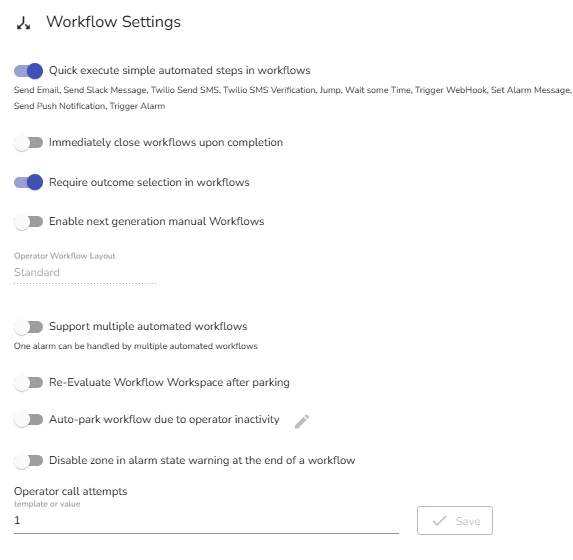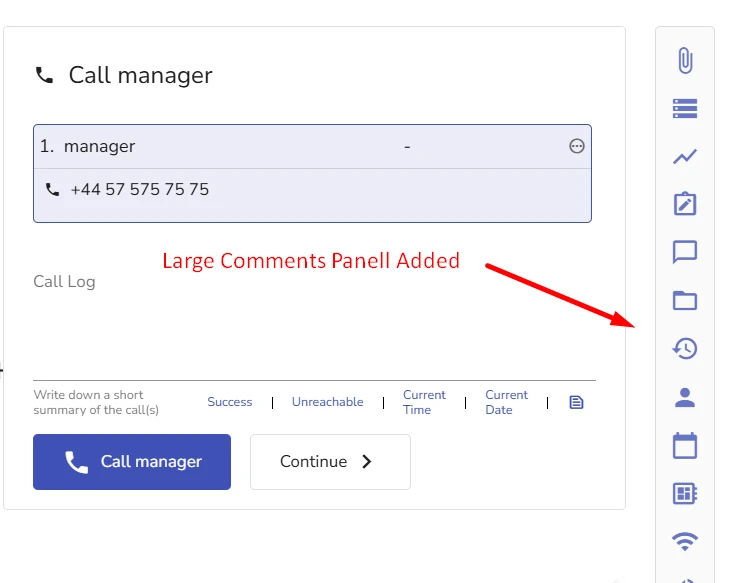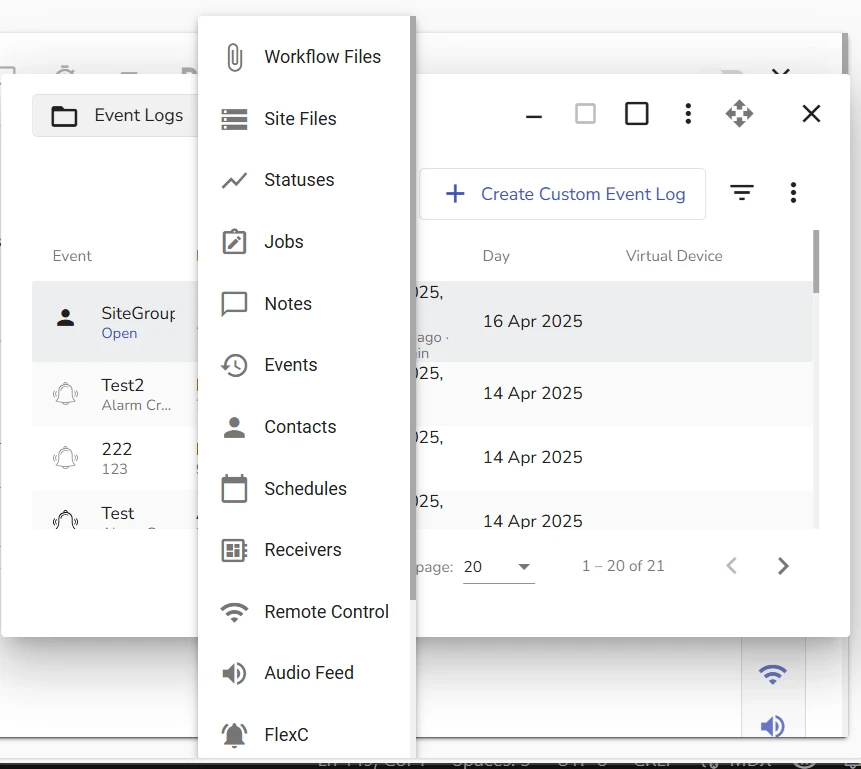Global Settings for Workflows
In this section, the term operator denotes an evalink talos user with any user role (Operator, Operator Minimal, Administrator, or Manager) who processes an alarm.
On the Company > Settings > Workflows page, it is possible to configure a number of global settings. Due to the nature of the settings, some of them apply to certain types of workflows only.
These settings are configurable by Administrators only.
Set Toggle Options
To configure the options described in subsections below, Administrator switches the corresponding toggles on the Company > Settings > Workflows page.
The figure below shows the toggles and their default values:

Quick Execute Simple Automated Steps in Workflows
This option applies to Manual Workflows only.
When On, automated steps in Manual Workflows (the ones enumerated under the toggle) are executed automatically.
When Off, the operator triggers automated steps manually while handling a workflow.
Default: On.
Immediately Close Workflows upon Completion
This option applies to Manual Workflows only.
When On, workflows are automatically closed after the last manual step is completed.
When Off, the operator always needs to close the workflow manually.
Default: Off.
If there are Workflow Outcomes configured in evalink talos, after a workflow is closed automatically, the operator may be requested to select a Workflow Outcome to apply. For details, see section Event Logging for Workflows > Event Logging Settings on the Workflow Level > The Workflow Outcome List to Be Applied.
For more details on Workflow Outcomes and Workflow Outcome Lists, see section Event Logging for Workflows > Global Event Logging Settings.
Require Outcome Selection in Workflows
This option applies to Manual Workflows only and is relevant if there's at least one Workflow Outcome created for the Company account (see section Event Logging for Workflows > Global Event Logging Settings > Workflow Outcomes).
When On, a Manual Workflow prompts the operator to select one of the outcomes from the Workflow Outcome List. See section Event Logging for Workflows > Global Event Logging Settings > Workflow Outcome Lists for details. The action is requested after all workflow steps are completed.
If there are no Workflow Outcome Lists configured, but there's at least one Workflow Outcome created, the default Workflow Outcome List setting logic applies. For details, see section Set the Workflow Outcome List to Be Used > Default Behavior in Event Logging for Workflows > Event Logging Settings on the Workflow Level.
When Off, outcome selection is not requested from the operator. The Workflow Outcome Lists set for workflows are ignored.
Default: On.
Enable Next Generation Manual Workflows
This option applies to Manual Workflows only.
When On, the Next Generation alarm processing view becomes available to all operators. The view includes a number of capabilities for optimized alarm processing.
When Off, all operators work in the regular (non-optimized) alarm processing view.
Default: Off.
Operator Workflow Layout
This option allows you to regulate the workflow layout for evalink talos users.
The default selection is Standard. If you enable Large Comments option, various site settings become available in the operator Workflow view from a side bar menu. When you click on them, they open in a separate dialog window for more convenient work.

From this menu, operators can access a number of settings associated with the workflow and with the site where the alarm processed by the workflow arrives, such as:
- Workflow files
- Site files
- Statuses
- Jobs
- Notes
- Event logs
- Events
- Contacts
- Schedules
- Receivers
- Remote control
- Autofeed

Support Multiple Automated Workflows
This option applies to Automated Workflows only.
When On, if an alarm matches the incoming conditions of several Foreground Automated Workflows, it is processed by all these workflows concurrently. For a definition of a Foreground Automated Workflow, see section Manual and Automated Workflows > Automated Workflows Executed in Foreground and in Background in Workflow Overview > Workflow Types.
When Off, only one matching Foreground Automated Workflow can consume and process the alarm. The selection of the consuming workflow is performed based on the priorities (see section Workflows Overview > Alarm Consuming Priority).
Default: Off.
Enabling this option doesn't incur any risk, since evalink talos allows a maximum of ten Automated Workflows of any subtype (Foreground or Background) to run concurrently per site.
Auto-park Workflow due to Operator Inactivity
When enabled, this option allows you to automatically park workflows that have been started, but haven't been finished yet.
When you enable this option, you can click on the Edit icon and set the inactivity timeout and notification timeout values in seconds.
Disable Zone in Alarm State Warning at the End of a Workflow
When a Company Admin enables this setting, evalink talos doesn't display warnings after the workflow finishes processing and the zone of the processed alarm remains in Alarm state.
Workflow Outcomes and Outcome Lists
Workflow Outcomes and Workflow Outcome Lists allow setting predefined globally configured event logging options for a workflow. For more information, see section Event Logging for Workflows > Global Event Logging Settings.
For details on setting Workflow Outcomes, see section Event Logging for Workflows > Global Event Logging Settings > Workflow Outcomes.
For details on setting Workflow Outcome lists, see section Event Logging for Workflows > Global Event Logging Settings > Workflow Outcome Lists.
New Alarms Attaching for Manual Workflows
While the operator is working on an alarm, new alarms that arrive from the same site (on which the workflow operates) can be attached to this alarm. The former and the newly attached alarms are then processed as a group according to the same workflow.
There is a global setting that defines how new alarms from the same site behave when there is a Manual Workflow in progress.
The setting can be configured by a user with Administrator permissions.
Note that an alarm can appear in the pool of new alarms if it is not assigned to an Automated Workflow and not forwarded by Alarm Dispatcher. See section Workflows Overview > Alarm Consuming Priority.
For details about workinf with Alarm Dispatcher, see section Alarm Dispatcher.
To set the global grouping policy for new alarms:
-
Go to the Company > Settings > Workflows page, scroll to the bottom of the page
-
To select the desired option, set the appropriate toggle to On position (see the figure below):

-
Group Alarms of the Same Site (the default option) – all new alarms from the same site are attached to the alarm that is being processed
-
Group Alarms by Conditions – all alarms matching the incoming conditions of the Manual Workflow that is in progress are attached
-
Don't Group Alarms – no new alarms are attached. For example, when an alarm is being processed, another alarm with identical parameters that arrives is put on hold and is then processed by another instance of the same workflow
- The globally-configured grouping policy can be overridden for a particular workflow in the workflow settings
For details, see section Operations with a Workflow > Work with Workflow Settings > Alarm Assignment.
- When processing an alarm, the operator can manually attach other alarms that arrive on the site to the alarm they are working on
Group Alarm Overflow Strategy
This setting allows evalink talos to handle situations when a limit of 100 alarms attached to a single workflow is reached.
Only Company Admins can configure this setting.
There are two available options:
-
Keep further alarms in the alarm queue
When this option is enabled, alarms that match a workflow settings and that otherwise would be processed by it, remain in the alarm queue if the workflow already has more than 100 unprocesed alarms attached to it.
-
Ignore further alarms in the Event Log
When this option is enabled, alarms that match a workflow settings for a workflow that already has 100 or more alarms attached to it are ignored in the Event Log.
If you set the overflow to Ignore, when the number of alarms attached to a workflow reaches the overflow limit, further alarms, when processed by evalink talos, still have an attached to workflow status and then evalink talos closes them automatically.
 Link is copied
Link is copied